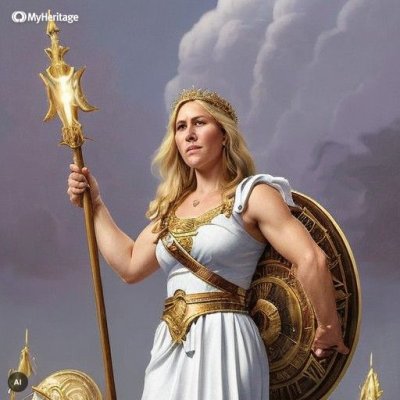An artificial intelligence app that visualizes how you may have looked in ancient Egypt, as a punk rocker, or a wild west fugitive has gone viral.
People across social media are sharing versions of their faces and body edited by the MyHeritiage AI Time Machine to look like the stereotypical person from a variety of eras across history.
So, what would politicians look like through time, as Vikings, ancient Greek warriors, cowboys, 1960s hippies, and pirates?
Newsweek processed images of former President Donald Trump, President Joe Biden, Congresswoman Marjorie Taylor Greene, Florida Governor Ron DeSantis and Representative Alexandria Ocasio-Cortez to find out.
Donald Trump






Joe Biden






Marjorie Taylor Greene






Ron DeSantis






Alexandria Ocasio-Cortez






MyHeritage, which developed this feature, is an online genealogy company that initially started by allowing users to build a family tree online. In recent years, the company expanded to use AI to bring historical photos to life and animate them, and now users can use AI on their own faces to see how they would look in the past.
This AI works by using text-to-image technology, which is different from the basic filter art you would experience on Snapchat, with the app placing dog ears on your head or distorting your facial features.
"The MyHeritage AI Time Machine utilizes text-to-image technology based on Stable Diffusion and licensed from Astria," Sarah Vanunu, the director of public relations at MyHeritage told Newsweek.
"Using a number of photos of one subject, it constructs a model that can depict the same person in a variety of poses and lighting conditions that are different from those in the original photos," she said. "Then, using a series of predefined themes, it synthesizes the model with motifs from the various themes to craft photorealistic images."
Text-to-image AI uses deep learning neural network algorithms to interpret text descriptions (in this case "Viking" or "cowboy") and edits the inputted pictures to create realistic images. Often, the algorithms are trained by scraping huge amounts of data from the internet, learning what a "Viking" should look like.
"The quality of the output you'll receive depends very much on the quality of the photos you upload. The more photos you upload and the more varied they are, the better your results will be," Vanunu said.
The results aren't always perfect, as can be seen in the images above. Marjorie Taylor Greene's left arm is seemingly bent backward in her ancient Greek variant, while Joe Biden's cowboy version has a face that isn't quite human.
Several AI of this ilk are available online, including DALL·E 2, which has been a popular way to generate AI art from language descriptors. People have shared the results of their experiments using these AI on social media, which have resulted in a variety of beautiful images that many could not distinguish from something human-made.
One strange emergence from DALL·E is an image that Twitter user @supercomposite dubbed "Loab." Loab is an image of a melancholy-looking woman with red cheeks that kept appearing in his AI art in a variety of horrifying ways, even after he attempted to weigh the language prompts in a way that would remove her.
🧵: I discovered this woman, who I call Loab, in April. The AI reproduced her more easily than most celebrities. Her presence is persistent, and she haunts every image she touches. CW: Take a seat. This is a true horror story, and veers sharply macabre. pic.twitter.com/gmUlf6mZtk
— Supercomposite (@supercomposite) September 6, 2022
"She is an emergent island in the latent space that we don't know how to locate with text queries," @supercomposite wrote in a Twitter thread. "But for the AI, Loab was an equally strong point of convergence as a verbal concept."
However, since the MyHeritage AI Time Machine™ uses only the user's face, there have been no cases of creepy things popping up in the images yet, except for strange similarities to photos of older family members.
"Many people are commenting about the family similarities they see between themselves and their AI images," Vanunu said.
Do you have a tip on a science story that Newsweek should be covering? Do you have a question about AI? Let us know via science@newsweek.com.
Uncommon Knowledge
Newsweek is committed to challenging conventional wisdom and finding connections in the search for common ground.
Newsweek is committed to challenging conventional wisdom and finding connections in the search for common ground.
About the writer
Jess Thomson is a Newsweek Science Reporter based in London UK. Her focus is reporting on science, technology and healthcare. ... Read more
To read how Newsweek uses AI as a newsroom tool, Click here.






